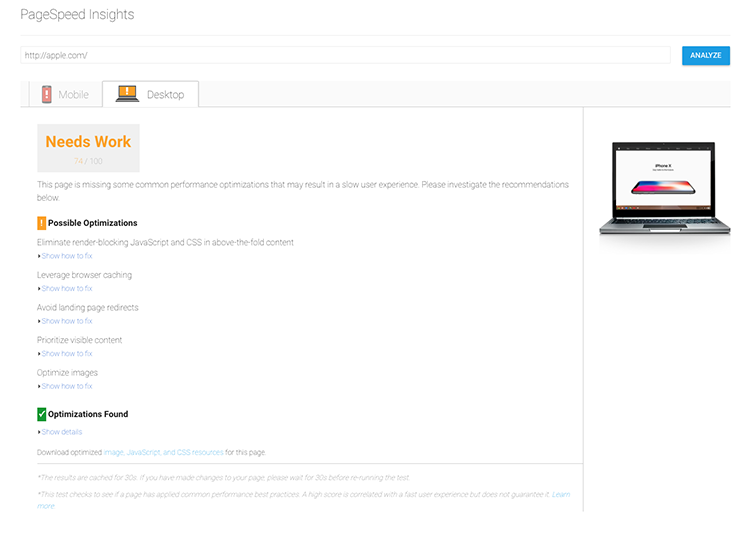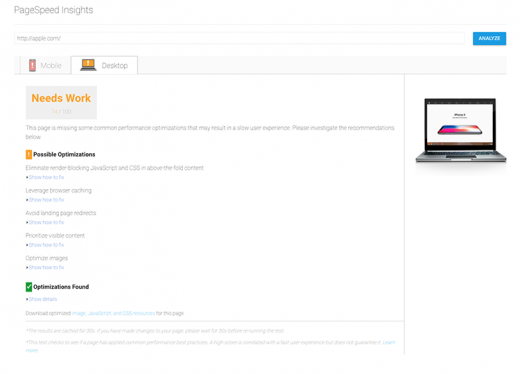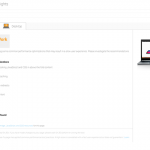There Is More to Life Than Increasing Its Speed
— December 9, 2017
That, according to Mahatma Gandhi who clearly was never a website visitor because when it comes to websites there is nothing more important than speed!
There are 3 reasons why it’s important to get your site to perform as quickly as possible:
- Conversions
- SEO Rankings
- Less Expensive PPC Charges
Website speed has always been a topic of conversation. It historically fell into the “user-friendly” category. Every time we heard people say that they wanted their website to be “user-friendly”, that comment was typically followed by “you know, it has to be fast”.
But what is fast? It’s a very subjective thing that is different for different people. That is until Google decided to start getting involved in the site speed conversation. In 2010 Google decided to use page speed as a ranking signal for SEO. In fact, here’s what Google said specifically about speed, back in 2010:
Speeding up websites is important — not just to site owners, but to all Internet users. Faster sites create happy users and we’ve seen in our internal studies that when a site responds slowly, visitors spend less time there.
So, back to the original question, what is fast. Today the bar seems to be hovering right around the 2-second mark. Forrester Research did a survey for Akamai, a global leader in Content Delivery Network (CDN) services, and what they found was that the average online user will wait no more than 2-seconds for a page to load and only 40% of users will wait 3-seconds!
In this post we’re going to look at each of these 3 reasons to make sure your site is performing well, we’ll give you some tools to see how your site is performing, and then we’re going to give you some tips on how to improve the speed of your site.
How Fast Are You?
The first step towards improvement is knowing exactly where you’re starting. Google provides a tool that you can use to determine the speed of a page within your website called PageSpeed Insights.

The results of your test will give you information on how your website page speed is as it relates to both desktop and mobile devices.
This web page speed test will check your website page to see if it has the most common best practices applied to it, and then it scores your website page on a scale from 0 to 100. The higher your score, the better your website page is performing.
Based on the score of your page, it will fall into one of three categories. Good, needs work, or poor.
- Good: If your page is ranked in the Good category then Google feels that your page will deliver a good experience to the people that are visiting the site.
- Needs Work:If your website page is ranked in the Needs Work category then Google has determined that there are a few performance issues that need to be addressed and they lay out some recommendations for you to look at that could give you some improvements in the performance and user experience with your page.
- Poor:If your page falls into the Poor category, Google is essentially saying that you need to make this a priority and get your web page optimized, soon.
How To Get Faster
There are some technical optimization tactics that you can use to speed up the pages within your website.
- Minimize Redirects: There are some reasons that redirects need to be used, but it’s important that you first, use the proper type of redirect based on what you’re trying to accomplish. And second, keep the number of redirects to an absolute minimum. Every redirect will make an additional call to your server which takes resources from the server and takes time for your user’s browser to execute.
- Use Caching: Every time someone comes to your site, every element (images, text, code, etc.) has to get downloaded by their browser. All of this takes time. Caching stores a copy of your site’s pages either within your user’s browser or on a server that is geographically closer to your user. This makes their experience with your website more positive. Enabling caching on your website is one of the best ways to positively impact the speed of your website.
- Optimize Images: Images are generally the single largest element on a webpage and require a delicate balance between size and clarity. In their native formats, images can grow to be huge, by internet standards. But, reduce the file size too much, and the image becomes grainy and will look horrible. Google has assembled a checklist for optimizing images.
- Improve Server Speed: At the core of every website is a server. The speed that the server delivers a web page can be directly linked to the “power” (memory and CPU) that the server has. There are a lot of different hosting packages out there, and one of the main drivers of hosting fees is how much “power” you are purchasing. If you’ve tried everything else to speed up your site and you can seem to get more from your optimization efforts, maybe it’s time to upgrade your hosting package.
Page Speed = Lower PPC Fees?!?!
Wait, what! How can this be?
When it comes to PPC, the per click fees are based on what Google calls your Quality Score. Here’s what they say:
Google uses a measurement called Quality Score as an estimate of how relevant your ads, keywords, and landing page are to a person seeing your ad. Higher Quality Scores typically lead to lower costs and better ad positions.
So, the next question, then is, what makes up the Quality Score. Google tells us that there are 3 components to the quality score:
- Expected click-through rate
- Ad relevance
- Landing page experience
It’s this last component that is impacted by the page speed of your site. If your page speed is too slow, the user will not have a good experience. If they don’t have a good experience, then your Quality Score decreases.
Here’s how it plays out for how much you spend for every click (CPC) on your ad. If you and one of your competitors are trying to get the top spot for an ad based on the same key-phrase. If all things are equal, except that your competitor has a higher Quality Score than you do. You will most likely pay more per click for a lower position on the search results page. In other words, you’ll pay more for spots #2, #3, #4 or worse than they will for spot #1
Have Questions?
Remember, page speed is a search ranking signal and will have an impact on your efforts to get top rankings on Google’s search engine. Also, page speed is a major component of the user’s experience of your website and will have a major impact on your site’s ability to increase your business. Don’t let the complexity of getting your site faster to interfere with improving your site’s speed.
Business & Finance Articles on Business 2 Community
(20)













